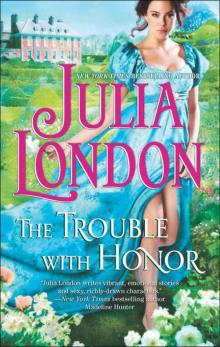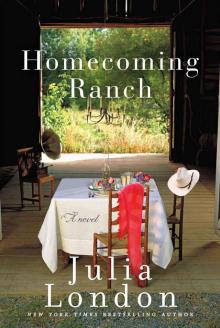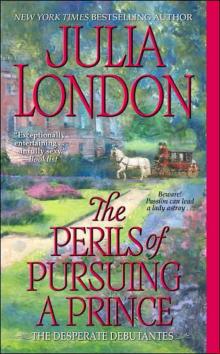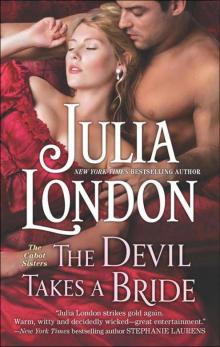- Home
- Julia London
The Perils of Pursuing a Prince Page 12
The Perils of Pursuing a Prince Read online
Page 12
He had no idea what she was talking about and looked at her again. She had moved deeper into the room, and again, he couldn’t help admiring the fit of her gown.
“The castle,” she clarified.
His dog Abel nudged her hand, and she smiled warmly down at him, scratching him behind the ears. Bloody dog. Did he not understand who fed him? “Isn’t there someplace you should be?” Rhodrick demanded.
“No,” she said pertly. “I am a prisoner here, remember?”
“You are not a prisoner.”
One sculpted brow rose above the other. “Oh, that’s right, I do beg your pardon. I am a reluctant guest.” She took a deep breath. “I wanted to thank you for saving my life,” she said, and then quickly turned her attention to the shelves that lined three of the four walls. “You have a lot of books.”
“Yes,” he said, taken aback by her expression of thanks, curt though it had been. “In addition to the books in here and in the library, there are more in the drawing room. Perhaps you’d be more comfortable admiring books there.”
She looked impressed and easily ignored his suggestion. “That is quite a lot of books. I can’t imagine the king of England has as many as this. I am rather astounded you would enjoy reading as much as you obviously do.”
“Astounded?” he echoed, surreptitiously glimpsing the curve of her hip and imagining it very bare. “Why?”
“I don’t think of tyrants as being terribly disposed to improving their minds, I suppose. Would you mind if I were to borrow one or two?” she asked. “To pass the time,” she added quickly. “It’s really very…quiet…here.”
Tiresome, she meant. There was nothing at Llanmair to entice a woman like Greer Fairchild. “A book? I am likewise astounded that you would enjoy reading.”
“Why is that?”
“I suppose I don’t think silly young women who go chasing about the Welsh countryside with men they scarcely know as being terribly disposed to improving their minds,” he quipped. “But you may borrow as many books as you like. Just…do it. Please,” he said, gesturing to the door.
With a wry smile, she looked at the shelves. “I shouldn’t expect you to understand my reasons for coming here, my lord. They are too pure to be relevant to a man with your purported moral character.”
He snorted at that and took a seat behind his desk, determined to concentrate on his work and not her. “You speak very elegantly of morals, Miss Fairchild. One might think you were actually in possession of one or two.”
She muttered something under her breath he could not quite hear. “May I start here?” she asked coolly.
With a wave of his hand, he said, “Anywhere you like.”
“Thank you.” She cast a smile over her shoulder that swept down his spine.
Rhodrick looked at the papers before him and tried to concentrate, but he could not. He was conscious that he was not dressed properly, and glanced ruefully at his coat and neckcloth tossed so carelessly onto the chair. Just beyond the chair, Greer Fairchild reached for a book on the highest shelf, and her gown stretched tightly across her back. He couldn’t help noticing her trim figure, her long and graceful arms. Her hair was swept up into curls and affixed with small ribbons to the back of her head. He could smell her, could recall the feel of her body against his, and could feel his own rusty body beginning to turn like the cogs of an old wheel as he imagined taking her in his bed.
She withdrew a book and opened it, turning slightly as she read so that her profile was presented to him. She had a slender column of a neck, and a dimple that creased her cheek as she smiled to herself at something she read. Her lashes, long and dark, flickered, and she lifted a hand, toying mindlessly with the earring dangling from her ear.
She wore her Welsh amulet around her neck. He recalled that amulet, the warmth and smoothness of her skin. The memory made him uncomfortably warm, and he was suddenly overwhelmed by the desire to touch her again.
This was absurd—Rhodrick forced his gaze to his desk. He was not some randy lad with no control over his sex. He’d gone too long without the company of a woman, that was all. He was allowing her scent to invade his thoughts, the image of her body to crawl under his skin. He squinted at the paper before him and read a sentence or two, but a moment later, Miss Fairchild exclaimed softly.
He glanced up.
“I have longed to see India,” she said, and glanced at him from the corner of her eye. “Have you been?”
It was a desire they shared, for he’d long been fascinated by India.
“This is a book about India,” she continued blithely. “It bears an inscription in Welsh.”
“Are you certain?” he drawled. “Having no recollection of the language, how might you determine if you are looking at Welsh or Greek?”
She colored slightly and shrugged a little. “I am certain it is Welsh, for it is in your house.”
He clucked his tongue and stood from his chair. She kept her gaze on him as he walked around the desk to her. When he held his hand out for the book, she placed it in his hands, her eyes on his as he attempted to take it from her. His fingers grazed hers, and that whisper of a touch singed him.
Miss Fairchild seemed to sense the heat, for her eyes glittered above a soft smile that brought a single dimple to her cheek.
He could feel the treachery stirring in him again, could feel his body awakening, the furnace deep inside him firing from a cold stone hearth.
Her smile widened, as if she sensed what she was doing to him and understood the power of her femininity. Yet he could not look away, nor seem to remove the book entirely from her hands. He could not seem to do anything but gaze into those eyes and feel his arousal warm his body.
Miss Fairchild’s gaze flickered to the page of the open book and to his eyes again. “You do read Welsh as well as speak it, do you not?”
He dragged his gaze from her face as he took the book from her hand and glanced at the inscription.
It took a moment for his mind to register what he was reading, for him to remember the book, and he felt as if he’d been kicked in the gut. It had been years since he’d received it as a gift, years since he’d even laid eyes on it.
“What does it say?” Miss Fairchild asked.
He shut the book and handed it to her. “’Rwy’n dy garu di, Eira.’”
She took the book and opened it again, looked at the inscription, running her elegant fingers over it. “What does it mean?”
“It means…‘I love you, Eira.’” He turned away, walked back to his desk.
“Oh,” she said behind him. “Do you know who Eira was?”
Rhodrick took his seat and looked out the windows at the rain that refused to stop falling, before shifting his gaze to Miss Fairchild. “She was my wife.”
Miss Fairchild’s eyes widened, but she did not speak. The playful look of amusement was gone from her face, replaced by something else entirely, something he could not and did not want to identify. “Perhaps you might enjoy the book in your suite,” he suggested.
She lowered her gaze, closed the book, and laid her hand on the cover a moment before returning it to the shelf. “I think I should prefer another one, if I may,” she said, and returned the book on India to its place on the shelf before taking another one nearby. “This is entitled A History of Wales and Her Peoples.”
Rhodrick did not recall that book, but it scarcely mattered. He looked at his desk, his mind racing for something to say, something to remove Eira’s presence from the room.
“Thank you,” Miss Fairchild said, the spark gone from her voice. “Good evening, my lord.”
He nodded helplessly, heard the rustle of her skirts, heard her walk through the open door, her footstep light on the carpet beyond the door.
When he could hear her no more, he muttered, “Nos da.” Good night. He leaned back in his chair and closed his eyes, thinking of a wife he had not thought of in years.
Twelve
I n her suite of rooms, Greer’s di
nner sat before her untouched, the book open on her lap.
She could see the words, but she could not comprehend them. She could smell the delicious aroma of beef but could not eat it. She knew the rain pattered against the window, but all she could hear was his voice, the low swell of hoarseness as he spoke. She was my wife.
The man was such an enigma! He hardly spoke at all, seemed to chafe at her presence, yet she had seen glimpses of raw human emotion shining through that gruff exterior, the hint of a man the world could not see. And she could not forget how fearlessly he’d saved her from harm.
Having been at Llanmair a full week now, Greer was beginning to appreciate that things were not as they seemed, and that discovery—or perhaps the questions it raised—intrigued her.
She looked at the open book in her lap, The History of Wales and Her Peoples, and began to read.
When Mrs. Bowen came to straighten her room the next morning, Greer had reached the point in Welsh history where Owain Glyndwr had led a revolt against England. As that would seem to require her studious concentration, she put the book aside. At present, she was more interested in Mrs. Bowen…or rather, the information Mrs. Bowen could give her.
She followed the housekeeper into the sitting room, where Mrs. Bowen was arranging a bouquet of hothouse flowers. They were very beautiful; they made the room seem less old somehow.
“They are stunning,” Greer said, leaning over to inhale their scent.
Mrs. Bowen smiled. “His lordship will be right pleased to hear it.”
Greer glanced at Mrs. Bowen. “Did…did he send them here?” she asked, astounded and appalled by the tiny surge of hope that accompanied her inquiry.
“Oh no, miss, I brought them up. But his lordship is very proud of his hothouse and the gardens. He’s known all over Wales for the gardens.”
The tiny bit of hope retreated to its proper place—deep and buried, thank you—and Greer walked around the table, running her hand over a porcelain figurine. “I’d wager that Lady Radnor had the hothouse built, expressly for the flowers…do you suppose?”
“The hothouse was here for many years before Lady Radnor was mistress.”
“Ah,” Greer said, and pretended to study the porcelain figurine. “How, ah…how did you say Lady Radnor died?”
“Childbirth,” Mrs. Bowen said as she picked up a pillow from the settee and plumped it. “Quite tragic, really. She bore him a girl, but bled something awful and never recovered. She passed two days afterward. And the infant, just two days after that.”
“How very awful,” Greer said. She had imagined a more sinister death—murder, suicide—not the tragedy of a childbirth gone awry.
“Oh yes,” Mrs. Bowen said, nodding. “It was devastating to his lordship.” She looked up from her pillow and glanced to the door before shifting her gaze to Greer and saying low, “He did not move from his study for days. He did not eat, nor did he speak. There were some who feared for his sanity.”
A sliver of trepidation snaked up Greer’s spine. “Was it very long ago?”
“Nigh on thirteen years,” Mrs. Bowen said, and picked up another pillow. “He’s all right now, of course. It’s all in the past, may she rest in peace.” She finished fluffing the pillows and smiled at Greer. “Is there anything you require, miss?”
“Yes,” she said quickly. “If you please, I should very much like some paper and ink so that I might write.”
“Of course.”
“My cousins and I write frequently,” Greer added with a bit of a laugh. “There are three of us, and Ava, now that she is married, is often in the country, and Phoebe—well, Phoebe hasn’t determined exactly where she will reside—”
“I shall be happy to arrange for pen and paper,” Mrs. Bowen said from the door. Greer hadn’t even seen her move.
“Just a few sheets of vellum,” Greer said after her. “I shan’t waste them. And…and two pens, if you please, for sometimes when I am writing, I wear out the quill.”
“Yes, miss.”
“Thank you!” Greer called after her as the housekeeper quit the room.
She walked back into the bedchamber and looked at the bed, picturing a young woman struggling to give birth and dying from the exertion. The image made her shudder, and she turned her chair around so that she couldn’t see the bed.
With a look at the windows—Still raining, she noted with some despair—she picked up her book and began to read about the warrior Owain Glyndwr.
Greer read through midmorning until her eyes were bleary. Fortunately, she was saved by the arrival of Lulu, who had come to gather her clothes for laundering. She watched the girl as she gathered the gowns Greer had worn this week, clearly admiring them as she folded them carefully.
“My cousin Phoebe made most of them,” Greer said.
Lulu quickly put the gowns down, embarrassed to have been caught admiring them.
“Oh no,” Greer said, rising to her feet. “You really must admire them. Phoebe is very talented.” She reached around Lulu and picked up the gown she had worn the first night she was at Llanmair and held it up to Lulu. “It suits you well,” she said, nodding thoughtfully. “A little large, but nonetheless.”
Lulu blushed. “Thank you, mu’um.”
“You must try it on,” Greer said authoritatively.
“Oh no, mu’um! I cannot!”
“Of course you can!” Greer said with a grin. “It will divert us!”
“Mrs. Bowen will have my head!”
“Ah, but Mrs. Bowen isn’t here,” Greer said with a wink, and a quarter of an hour later, Lulu held the extra fabric of the gown tight at her back and twisted one way and then the other, admiring herself in the mirror, as Greer sorted through her jewelry to enhance Lulu’s new appearance.
Lulu was delighted and exclaimed more than once she’d never felt so fine. But eventually, Lulu reluctantly put the gowns away and went about her work, leaving Greer to her book. As riveted as Greer was by the history she was reading, she desperately needed some air and decided to take yet another tour of the castle.
This time, she headed for the west wing, where she had not yet been.
Apparently, scarcely a soul had set foot in the west wing. The corridors were quite empty and cold and distinguished by the number of bedchambers—she counted a dozen—and sitting rooms it housed, as well as a salon that would, she thought, take the afternoon sun if it ever stopped raining.
What little furniture there was had been covered, and almost every room had a dank smell to it. It hardly surprised Greer—she could not imagine that a man like the prince had the sort of friends who would linger over a long weekend. Especially in a place as remote as Llanmair.
On the main floor of the west wing, she saw Lulu and another chambermaid polishing a pair of end tables. She dared not chat with them as she would have liked for fear of being rebuked for it, and slipped into a room nearby.
It was a formal dining room. It was furnished with a long table that would accommodate forty persons—Greer counted the number of upholstered chairs set around it. One wall was actually a long bank of windows overlooking the gardens; its opposing wall was lined with two enormous buffets and a massive hutch that held china marked with a seal. Three large gold chandeliers hung above the table, and on the far wall was a hearth so large that a child could play inside it.
It was very impressive, but like so many other rooms in the castle, it looked as if it were seldom used. Greer pulled the door shut and idly walked to the door across the hall as she tried to picture the prince at the head of such a large table. She wondered if he managed to converse, or if he treated all his guests, reluctant or otherwise, to a lot of yeses and nos.
That’s what she was thinking when she opened the door across the hall. Until she saw the footman, she didn’t realize that she hadn’t even knocked. Her heart thudded with surprise and embarrassment, and she quickly shut the door and backed away from it. Before she could make an escape, however, the footman opened the door w
ide, bowed low, and stepped to one side so that she could see the prince.
The room was a smaller, more intimate dining room, and he was seated at the head of the table having a solitary luncheon. His intense eyes were coolly watching her—he was leaning back in a thronelike chair, one arm draped across the arm of it, one hand wrapped around the stem of a wineglass. His hair brushed the tops of his shoulders, and his clothes were impeccable—he wore a black coat, a striped silk waistcoat, and a neatly tied neckcloth.
Greer realized she was gaping at him and summoned a smile. “Good afternoon.”
The prince picked up a piece of meat from his plate as his gaze took her in. He sucked the meat from a small bone as he casually perused her, then tossed it onto his plate, picked up a linen cloth, and wiped his mouth. “Does one enter rooms without knocking in the fine homes of London?” he asked as he neatly folded the linen cloth and laid it beside his plate.
A bit of heat spread across Greer’s scalp. “I do beg your pardon, my lord, but I thought this wing of the castle was as empty as the rest of it.”
“Were you looking for something…or perhaps someone? What am I to think, when you are forever appearing in places you’ve not been invited?”
Surprisingly, Greer thought she detected the barest hint of a smile on the prince’s rugged face and gave him a withering look. “You are to think your reluctant guest is quite bored. I was just having a look about,” she said, and glanced self-consciously at the two footmen attending him. “You may have noted that it is still raining, and I have grown rather restless.”
“I can only imagine your restlessness, as this is not high society.”
She folded her arms and leaned against the door frame. “No,” she said wryly. “Far from it.”
He smiled a little before sipping from his wine goblet. “Have you eaten?”
She nodded.
“Then is there something else I might do for you?”
“No. Thank you.” She thought to leave him to his luncheon, but couldn’t quite bring herself to do it. His gaze flicked over her, eyeing her so intently that she began to feel as if she were standing there not clad in the blue day gown she wore, but in her chemise. Or perhaps even less. “Well…,” she said, and pushed away from the door. “I shall leave you—”

 A Royal Kiss & Tell
A Royal Kiss & Tell You Lucky Dog
You Lucky Dog The Devil in the Saddle
The Devil in the Saddle The Trouble with Honor
The Trouble with Honor Tempting the Laird
Tempting the Laird The Secret Lover
The Secret Lover A Light at Winter’s End
A Light at Winter’s End The Charmer in Chaps
The Charmer in Chaps Homecoming Ranch
Homecoming Ranch Jack (7 Brides for 7 Soldiers Book 5)
Jack (7 Brides for 7 Soldiers Book 5) A Courtesan's Scandal
A Courtesan's Scandal Hard-Hearted Highlander--A Historical Romance Novel
Hard-Hearted Highlander--A Historical Romance Novel The Complete Novels of the Lear Sister Trilogy
The Complete Novels of the Lear Sister Trilogy The Last Debutante
The Last Debutante Suddenly Single (A Lake Haven Novel Book 4)
Suddenly Single (A Lake Haven Novel Book 4) Seduced by a Scot
Seduced by a Scot Highlander Unbound
Highlander Unbound Suddenly Dating (A Lake Haven Novel Book 2)
Suddenly Dating (A Lake Haven Novel Book 2) The Bridesmaid
The Bridesmaid The Seduction of Lady X
The Seduction of Lady X One Mad Night
One Mad Night Extreme Bachelor
Extreme Bachelor The Scoundrel and the Debutante
The Scoundrel and the Debutante The Revenge of Lord Eberlin
The Revenge of Lord Eberlin American Diva
American Diva The Lovers: A Ghost Story
The Lovers: A Ghost Story The Hazards of Hunting a Duke
The Hazards of Hunting a Duke Return to Homecoming Ranch (Pine River)
Return to Homecoming Ranch (Pine River) The Perils of Pursuing a Prince
The Perils of Pursuing a Prince Highlander in Love
Highlander in Love The Devil Takes a Bride
The Devil Takes a Bride Devil in Tartan
Devil in Tartan Wild Wicked Scot
Wild Wicked Scot Snowy Night with a Highlander
Snowy Night with a Highlander One Season of Sunshine
One Season of Sunshine Summer of Two Wishes
Summer of Two Wishes All I Need Is You aka Wedding Survivor
All I Need Is You aka Wedding Survivor Sinful Scottish Laird--A Historical Romance Novel
Sinful Scottish Laird--A Historical Romance Novel Suddenly Engaged (A Lake Haven Novel Book 3)
Suddenly Engaged (A Lake Haven Novel Book 3) Highlander in Disguise
Highlander in Disguise Suddenly in Love (Lake Haven#1)
Suddenly in Love (Lake Haven#1)